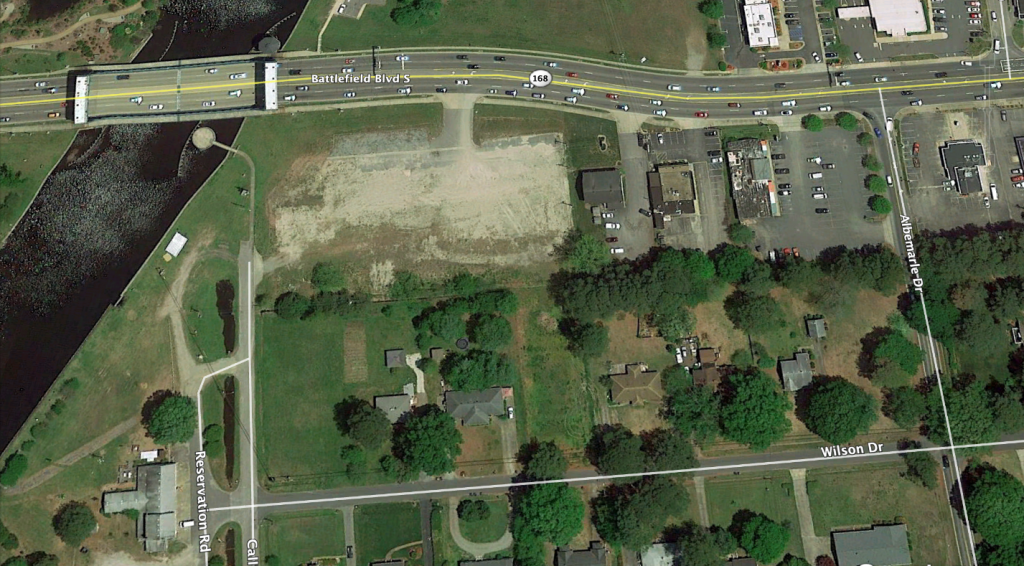
The subject property is the sand or gravel patch in the photo above with an entrance onto Battlefield Boulevard. Callison Drive is the unmarked dead-end street running vertically on the left side of the image. The city initially proposed to abandon the portion of Callison Drive that abutted the Hooked Group property and convey the abandoned right-of-way to Hooked Group. However, after concerns were expressed by residents in the neighborhood pictured behind the subject property in the photo above, the city decided that, rather than abandoning that part of the road, access to the road should instead be limited to emergency vehicles only. That meant that non-emergency vehicles seeking to access Hooked Group’s property once it is developed would only be able to do so from the main entrance to the property from Battlefield Boulevard.
Hooked Group sued the city under a theory of inverse condemnation, asserting that the city’s action took its right of access to Callison Drive. After the trial court dismissed its action, it appealed. It advanced two main arguments on appeal. First, it argued that, under the amendments to Article I, § 11 of the Virginia Constitution and Va. Code §§ 25.1-100 and 25.1-230.1, the city should be liable for the “lost access” Hooked Group suffered from the city’s actions. Specifically, Hooked Group argued that the statutes defined lost access as a material impairment of direct access to property and that the city’s limitation of traffic eliminated its direct access to Callison.
Second, Hooked Group argued that, even under case law that interpreted the relevant constitutional provision before the amendment, the elimination of all access to one street is compensable even if access to the property still exists from another road. In support of that argument, Hooked cited three cases: State Highway & Transportation Commissioner v. Linsly, 223 Va. 437 (1982), State Highway & Transportation Commissinoer v. Dennison, 231 Va. 239 (1986), and State Highway & Transportation Commissioner v. Lanier Farm, Inc., 233 Va. 506 (1987). In Linsly, the court held that a complete extinguishment of access to a highway was compensable in a case where the Highway Commissioner condemned the portion of the subject property fronting on a highway to facilitate the creation of a limited access highway. The fact that the commissioner substituted indirect access via a service road did not change the result. In Dennison, the property that was affected by the condemnation suit sat between two parallel roads, one a four-lane highway and the other a two-lane road. The project eliminated all of the property’s access to the highway, though access remained to the two-lane road. The appellant landowner, Hooked Group, argued that Dennison held that the loss of access in that situation was compensable, and thus, the fact that Hooked Group retained direct access to its property via Battlefield Boulevard was of no moment.
The city, on the other hand, argued that case law recognized that a landowner’s right of access is subordinate to a municipality’s police power to control the use of streets to promote the health, safety, and welfare of the public. Citing Wood v. City of Richmond, 148 Va. 400 (1927), a case in which the owner of a gas station had sued a city seeking an injunction barring the city from revoking a permit for an entrance to one of the two streets that abutted the station, the city argued that a landowner does not hold an absolute right of ingress and egress to an abutting public street but instead a right of reasonable access generally. Because Hooked Group had not alleged that it no longer had reasonable access as a result of the city’s action, the city argued that Hooked Group had failed to state a claim. In addition, the city argued that Hooked Group had failed to present certain arguments stemming from the amendments to the constitution and eminent domain statutes at the trial court level, thereby waiving them. Finally, the city distinguished Dennison by noting that the court in Dennison did not announce a per se rule that the elimination of access to one of two abutting highways was compensable.
During oral arguments, the parties largely restated their positions from their briefs. Hooked Group attempted to distinguish Wood on the basis that it was not an eminent domain or inverse condemnation case. Instead, it was an action for an injunction in a case involving a permit that specified that it was revocable. Because no such permit was involved here and Hooked Group was not seeking to bar or overturn the city’s action, it argued that Wood should not apply. The city, on the other hand, emphasized the lack of allegations concerning the unreasonableness of the remaining access. Because the allegations failed to establish a taking, the city argued, the case was properly dismissed.
A decision in the case, which has been assigned Record No. 190764 by the court, is expected within the next couple months.
Matt Hull is a Pender & Coward attorney focusing his practice on eminent domain/right of way, local government, and waterfront law matters.




Leave A Comment